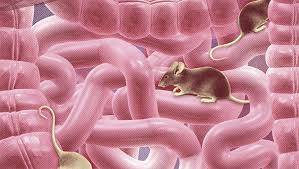 Guar gum, polysorbate-80, locust bean gum, carrageenan, xantham gum, lecithin…..these are all commonly found in processed foods of all types. And they were commonly thought to be safe to consume. It turns out that may not be the case. A well-researched and publicly-funded study published in Nature recently strongly suggests that these and other emulsifiers may promote the inflammatory bowel diseases such as ulcerative colitis and Crohn’s disease as well as a group of obesity-related conditions. What’s more, in the last 30 years, ingestion of these emulsifiers may have even contributed to the rise in irritable bowel syndrome (IBS), celiac disease, gluten and glucose intolerance and even Crohn’s and chronic colitis. The study, which is one of the first to look at whether food additives, considered safe by the U.S. Food and Drug Administration (FDA), are bad for our health, was conducted by Georgia State University’s Institute for Biomedical Sciences, and funded by the National Institutes of Health and Crohn’s & Colitis Foundation of America. The study is among the first to explore whether food additives that have been deemed safe by the Food and Drug Administration may be quite unhealthy if not downright dangers to eat.
Guar gum, polysorbate-80, locust bean gum, carrageenan, xantham gum, lecithin…..these are all commonly found in processed foods of all types. And they were commonly thought to be safe to consume. It turns out that may not be the case. A well-researched and publicly-funded study published in Nature recently strongly suggests that these and other emulsifiers may promote the inflammatory bowel diseases such as ulcerative colitis and Crohn’s disease as well as a group of obesity-related conditions. What’s more, in the last 30 years, ingestion of these emulsifiers may have even contributed to the rise in irritable bowel syndrome (IBS), celiac disease, gluten and glucose intolerance and even Crohn’s and chronic colitis. The study, which is one of the first to look at whether food additives, considered safe by the U.S. Food and Drug Administration (FDA), are bad for our health, was conducted by Georgia State University’s Institute for Biomedical Sciences, and funded by the National Institutes of Health and Crohn’s & Colitis Foundation of America. The study is among the first to explore whether food additives that have been deemed safe by the Food and Drug Administration may be quite unhealthy if not downright dangers to eat.
These food additives are in almost all processed foods, including ice cream, margarine, packaged bread and many processed foods. The emulsifiers carboxymethylcellulose, often referred to as cellulose gum, and polysorbate 80, also known as Tween 80, add bulk to foods and keep sauces smooth and frozen confections from separating. They plump up fast-food shakes, keep bottled salad dressings creamy, and prevent ice cream from dissolving into an unsightly soup when left out. Emulsifiers are used in margarine, mayonnaise, creamy sauces, candy, ice cream, packaged processed foods and baked goods. They can make products like mayonnaise smooth and creamy instead of an unappetizing amalgam of water and oily globules. (Egg yolks were originally used as this destabilizing emulsifier, but now, food manufacturers use lower-cost emulsifiers, like Polysorbate 80). They’re also used extensively in pharmaceuticals, to improve the consistency of gel capsules, to make pills come apart in the stomach, and to keep medication suspended in fluids. Researchers have suspected that emulsifiers damage the gut, allowing bacteria to cross the delicate epithelium and set off a chain reaction that can lead to weight gain, metabolic syndrome (the triad of high cholesterol, high blood pressure and diabetes) and/or inflammatory bowel disease. So researchers used mice in a series of experiments to learn more about what two of the most commonly used food emulsifiers do to the intestinal tract. Emusifiers such as polysorbate 80 are detergent-like molecules which apparently disrupt the protective mucus barrier of the gut, which prevents gut bacteria from contacting cells of the gut lining. Contact can trigger immune response, and result in chronic inflammation, which is implicated in a large number of diseases with rising incidences: colitis, obesity, metabolic syndrome, Crohn’s Disease, IBD.
The dramatic increase in these diseases has occurred despite consistent human genetics, suggesting a pivotal role for an environmental factor. Scientists found that food interacts intimately with the microbiota so we considered what modern additions to the food supply might possibly make gut bacteria more pro-inflammatory. The study fed two common emulsifiers to rats in volumes that mimic their widespread consumption in humans, both emulsifiers induced low-grade inflammation, increased weight gain and fat deposition, caused worrisome changes in metabolic function, and changed the mix of bacteria that colonized their digestive tracts, the authors reported. The two emulsifiers appeared to administer a one-two punch to the gut. The detergent-like molecules were found to erode the mucous membrane that lines the gut and provides a buffer between the delicate epithelial cells of the intestinal surface and the garden of microorganisms that flourish there.
The food additives also appeared to alter the composition of gut microbes, not only boosting strains that promote inflammation but driving down strains that check the process. All fingers are now pointed at the FDA, which had previously approved these food additives as safe. But the scientists point out that FDA safety testing of food additives has generally sought to rule out the possibility that their ingestion would cause immediate poisoning, or that its ongoing consumption would cause cancer, the authors said. The FDA’s process, they added, is not designed to detect the effects of daily consumption of an additive on such subtle measures as inflammation and microbiotic diversity — which research suggest are probably linked.
While it’s not clear whether the emulsifier-induced inflammation seen in rats reflects what goes on in the human gut in response to carboxymethylcellulose and polysorbate 80, the team is now testing additional emulsifiers and designing experiments to investigate how emulsifiers affect humans. If similar results are obtained, it would indicate a role for this class of food additive in driving the epidemic of obesity, its inter-related consequences and a range of diseases associated with chronic gut inflammation. Hopefully, more will be known in the coming years. But all signs are that emulsifiers may not be the friend that we’d once thought. It may be time to go back to the common egg yolk — so far, it has stood the test of time as one of nature’s best emulsifiers.

